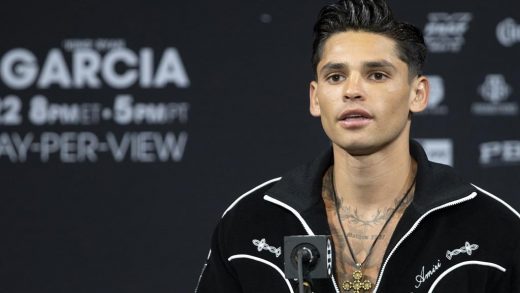:format(webp)/https://www.thestar.com/content/dam/thestar/entertainment/movies/2023/05/19/at-the-cannes-film-festival-screen-romance-is-fraught-with-risk/strange_way_of_life.jpg)
CANNES, FRANCE A cowboy named Silva (Pedro Pascal) rides into the dusty American desert town of Bitter Creek. He has romantic old business to attend to and also some dangerous new business.
It’s the start of “Strange Way of Life,” a new movie by Spanish auteur Pedro Almodóvar, which is having its world premiere at the Cannes Film Festival.
Love is in jeopardy up on the big screen, in this film and others screening here until May 27. The mating dance and its consequences are far more extreme than in the boy-meets-girl formula of Hollywood rom-coms.
Silva’s old business is Jake (Ethan Hawke), his former partner in mayhem — they were guns for hire — and also in the bedroom. For two glorious months 25 years ago, they were a passionate couple before a disagreement about their future tore them apart.
“To our reunion,” says Jake, now the town’s sheriff, as he lifts a toast to Silva, adding, “to whatever you like.”
It’s the “whatever you like” part that makes “Strange Way of Life” interesting. Before the credits roll on this 31-minute queer western, Almodóvar’s short, sharp answer to “Brokeback Mountain,” a film he almost made, lovemaking will happen, but so will gunshots fired in anger.
There’s a similar fraught pairing in “Jeanne du Barry,” a period romance by French actor/director Maïwenn that opened the fest on Tuesday.
The fact-based story stars Maïwenn as the title “harlot,” an uninhibited and sexually aware commoner who stole the heart of French King Louis XV, played by Johnny Depp, as he stole hers, in the waning years of the 18th century and the king’s reign.
Their unorthodox union scandalized opulent Versailles, a kingdom within a country where appearances and behaviour count for everything and transgressions lead to social exile or worse.
After being summoned to the bed of the randy monarch, Jeanne is given strict instructions how to proceed, among them the warning, “Whatever you do, don’t look the King in the eyes.”
She promptly ignores the edict, to the delight of the king, and to the fury of his many shocked courtiers and appalled four daughters.
“I may not know what love is,” Jeanne says, “but I know what this is.”
If you know your French history, this is risky behaviour indeed — and there’s been much talk at Cannes about Maïwenn’s choice of American actor Depp to play the French King, especially given Depp’s litigious breakup with Amber Heard, his former wife.
Maïwenn told a press conference she considered having a French actor play Louis XV, but ultimately the choice came down to personal chemistry: “I wanted to feel strongly about the actor, particularly as I would be hugging and kissing him later on.”
There’s a strange kind of three-way relationship happening in “May December,” a film by Todd Haynes that is among the 21 competing for the Palme d’Or.
Julianne Moore and Natalie Portman star as women whose personal and professional lives intersect in unforeseen ways. Julianne is Gracie, whose marriage to the considerably younger Joe (Charles Melton of TV’s “Riverdale”) sparked tabloid headlines 20 years ago.
About to enter the empty-nest phase of their successful union, they accept a request by an actor, Portman’s Elizabeth, to move in with them to study them close up. Elizabeth is planning to play Grace in a film about the couple’s past, but the close quarters and unearthing of secrets and grievances make for an increasingly tense situation for all three.
With all the complications of these films it’s almost a relief that Monia Chokri’s “The Nature of Love (Simple comme Sylvain),” one of three Canadian features premiering at Cannes ’23, is only about a garden-variety affair — or so it seems at first.
“Love should be simple,” declares Laurentians home renovator Sylvain (Pierre-Yves Cardinal) to his new swoon Sophia (Magalie Lépine Blondeau), a professor at a Montreal university.
Fair enough, although Sophia teaches a course on the philosophy of love and she’s adept at analyzing its many contours. Simplicity is the opposite of how she approaches romance.
She’s been married for 10 years to Xavier (Francis-William Rhéaume), a fellow intellectual who is fond of saying things like “humanity is a parasite” in dinner-table discussions with their friends.
What Sophia doesn’t count on is how hard she will fall for blue-collar Sylvain, whose idea of devotion proves to be more complicated than he lets on. At one point, a dog collar and leash enter the picture as Sophia struggles to convince Sylvain of her loyalty to him, all while her carefully controlled life begins to shatter.
If there’s one constant in these films and others at Cannes ’23, it’s that love and romance are unpredictable and potentially explosive.
Such is the nature of filmmaking, as actor Hawke observed in the Q&A session with Almodóvar following the premiere Wednesday of “Strange Way of Life” in the Debussy Theatre. (Pedro Pascal didn’t make the trek to Cannes; he’s reportedly preparing for a major role in Ridley Scott’s planned sequel to “Gladiator,” the Best Picture Oscar winner for 2000.)
Hawke said the very act of taking out a camera to capture a performance means “there’s some kind of love that’s happening” because of the intimacy of the medium.
“To me, it’s kind of always about love, in some capacity … it makes the world spin around.”
JOIN THE CONVERSATION
does not endorse these opinions.
:format(webp)/https://www.thestar.com/content/dam/thestar/entertainment/movies/2023/05/19/at-the-cannes-film-festival-screen-romance-is-fraught-with-risk/jeanne_du_barry.jpg)
:format(webp)/https://www.thestar.com/content/dam/thestar/entertainment/movies/2023/05/19/at-the-cannes-film-festival-screen-romance-is-fraught-with-risk/may_december.jpg)
:format(webp)/https://www.thestar.com/content/dam/thestar/entertainment/movies/2023/05/19/at-the-cannes-film-festival-screen-romance-is-fraught-with-risk/the_nature_of_love.jpg)



